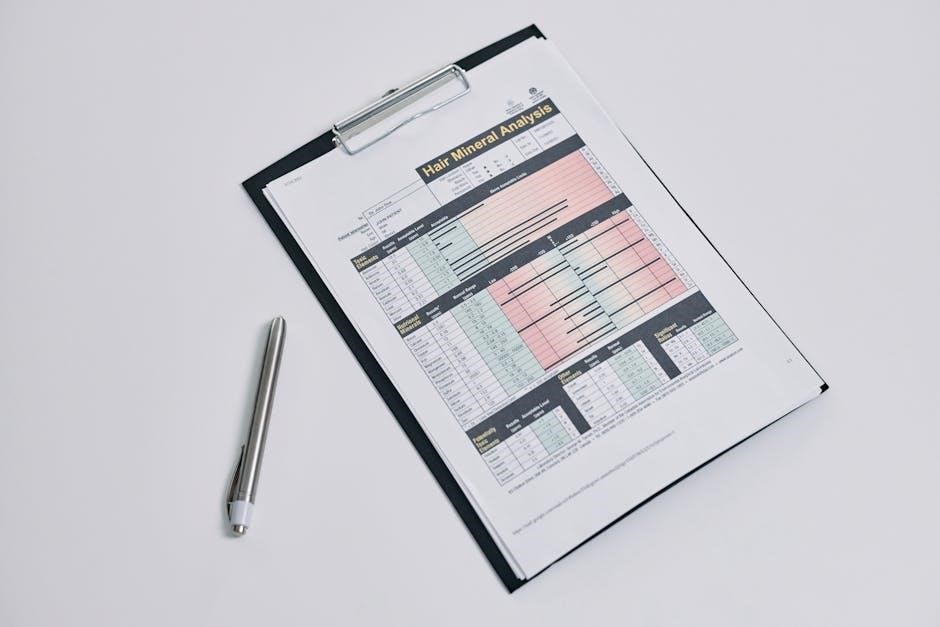mini mental state examination form pdf

The Mini-Mental State Examination (MMSE) is a widely recognized tool for assessing cognitive impairment‚ developed by Folstein et al; in 1975․ This 30-point questionnaire evaluates various cognitive functions‚ including orientation‚ memory‚ and language‚ providing a quick and effective screening method for dementia and other cognitive disorders․ Its simplicity and accessibility‚ including downloadable PDF forms‚ make it a popular choice in clinical and research settings worldwide․
Overview of the Mini-Mental State Examination (MMSE)
The Mini-Mental State Examination (MMSE) is a 30-point questionnaire designed to assess cognitive impairment‚ particularly in dementia․ Created by Folstein et al․ in 1975‚ it evaluates orientation‚ registration‚ attention‚ memory‚ language‚ and the ability to follow commands․ The test is brief‚ typically taking 5–10 minutes to administer‚ and is widely used in clinical and research settings․ Its simplicity and accessibility‚ including availability as a downloadable PDF form‚ make it a practical tool for screening cognitive dysfunction․ The MMSE is not diagnostic but serves as a valuable indicator of cognitive status‚ aiding healthcare professionals in identifying potential impairments and monitoring changes over time․
Importance of the MMSE in Cognitive Assessment
The MMSE holds significant importance in cognitive assessment due to its effectiveness in identifying and monitoring cognitive impairments․ As a standardized tool‚ it provides consistent results across diverse populations‚ making it invaluable for both clinical practice and research․ The MMSE is particularly useful for detecting early signs of dementia and other cognitive disorders‚ enabling early interventions․ Its brevity and ease of administration make it accessible for healthcare providers‚ ensuring widespread use․ Furthermore‚ the MMSE serves as a baseline measure for tracking cognitive changes over time‚ aiding in the evaluation of treatment efficacy․ Its availability in PDF form facilitates easy distribution and administration‚ enhancing its utility in various healthcare settings globally․

Structure of the MMSE
The MMSE is a 30-point assessment composed of sections evaluating orientation‚ registration‚ attention‚ memory recall‚ language‚ and the ability to follow commands․
Components of the MMSE Form
The MMSE form consists of several key components designed to assess cognitive function․ It includes sections for orientation‚ testing knowledge of time‚ place‚ and person (10 points)․ Registration evaluates the ability to repeat named prompts (3 points)․ Attention and calculation involve tasks like serial subtraction (5 points)․ Memory recall requires naming three objects (3 points)․ Language assessment includes naming objects‚ repetition‚ reading‚ writing‚ and drawing (8 points)․ Finally‚ command following tests the ability to obey instructions (3 points)․ Each section is scored individually‚ with the total ranging from 0 to 30․ This structured format ensures a comprehensive evaluation of cognitive abilities‚ making the MMSE a reliable screening tool for dementia and other cognitive impairments․
Scoring System and Interpretation
The MMSE is scored out of 30 points‚ with higher scores indicating better cognitive function․ Orientation (10 points) assesses time and place awareness․ Registration (3 points) tests the ability to repeat words․ Attention and calculation (5 points) involves tasks like subtracting serial numbers․ Memory recall (3 points) evaluates the ability to remember three objects․ Language (8 points) includes naming‚ repetition‚ reading‚ writing‚ and drawing․ The final section‚ command following (3 points)‚ tests comprehension․ Scores are interpreted as follows: 24–30 = normal cognitive function‚ 18–23 = mild impairment‚ 12–17 = moderate impairment‚ and ≤11 = severe impairment․ Lower scores correlate with greater cognitive decline․ This system provides a standardized way to assess and monitor cognitive changes over time․
Time Required for Administration
The MMSE is designed to be a brief cognitive screening tool‚ typically requiring 5 to 10 minutes to administer․ The test is divided into several sections‚ each assessing different cognitive functions․ Orientation questions‚ such as asking about the date or location‚ are usually completed quickly․ Registration and attention tasks‚ like repeating words or performing calculations‚ take a few minutes․ Memory recall and language tasks‚ including writing or drawing‚ may require slightly more time․ The structured format ensures efficiency‚ making it suitable for clinical settings․ Despite its brevity‚ the MMSE provides valuable insights into cognitive function․ Its short duration makes it practical for routine assessments and monitoring changes over time․

Administration of the MMSE
The MMSE is administered by trained professionals‚ assessing cognitive functions like orientation‚ memory‚ and language․ It involves standardized questions and tasks‚ ensuring consistency․
Instructions for Administering the Test
The MMSE must be administered by a trained professional to ensure accuracy․ Begin by introducing the test and providing clear instructions․ Ask questions in the specified order‚ starting with orientation‚ such as the date and location․ Score one point for each correct response‚ with a maximum of 30 points․ For tasks like writing a sentence or drawing shapes‚ ensure the participant understands the instructions before proceeding․ Allow adequate time for responses‚ and do not prompt or correct during the test․ If a participant cannot answer‚ score zero for that item․ Maintain a neutral and supportive demeanor to minimize anxiety․ The test typically takes 5-10 minutes to complete․ Ensure all responses are recorded accurately on the MMSE form for proper scoring and interpretation․
Key Questions and Tasks in the MMSE

The MMSE comprises 22 questions and tasks assessing cognitive function․ Key sections include orientation‚ asking for the date and location․ Memory is tested by recalling three words․ Attention and calculation are evaluated through tasks like the “world” reversal․ Language skills are assessed by naming objects‚ repeating phrases‚ and writing a sentence․ A drawing task requires copying a geometric shape․ Each question or task is scored based on correctness‚ with clear criteria outlined in the MMSE form․ These elements provide a comprehensive yet brief evaluation of cognitive status‚ aiding in early detection of impairments․ Proper administration ensures reliable results‚ making the MMSE a valuable screening tool in clinical settings․
Scoring Criteria for Each Section
The MMSE scoring system allocates points across five main cognitive domains: orientation‚ registration‚ attention‚ memory‚ and language․ Orientation questions‚ such as asking the date or location‚ are worth up to 10 points․ Registration‚ which involves repeating three words‚ awards up to 3 points․ Attention and calculation tasks‚ like the “world” reversal‚ contribute 5 points․ Memory is assessed by recalling the three previously stated words‚ worth up to 3 points․ Language skills‚ including naming objects‚ repeating phrases‚ and writing a sentence‚ account for 8 points․ A drawing task evaluates spatial ability‚ contributing 1 point․ Each correct response earns 1 point‚ with scoring criteria clearly defined in the MMSE form․ This structured system ensures consistency and reliability in assessing cognitive function․

Interpretation of MMSE Scores
Scores range from 0 to 30‚ with higher values indicating better cognitive function․ A score of 24-30 suggests no cognitive impairment‚ 18-23 indicates mild impairment‚ and below 18 suggests severe cognitive dysfunction․
Score Ranges and Their Significance

The MMSE scores range from 0 to 30‚ with higher scores indicating better cognitive function․ A score of 24-30 is considered normal‚ suggesting no significant cognitive impairment․ Scores between 18-23 indicate mild cognitive impairment‚ often requiring further evaluation․ A score below 18 suggests severe cognitive dysfunction‚ typically associated with dementia or other serious neurological conditions․ These ranges help clinicians assess the severity of cognitive deficits and monitor changes over time․ However‚ scores must be interpreted in the context of the patient’s education‚ language‚ and cultural background‚ as these factors can influence results․ This standardized scoring system provides a reliable framework for identifying and managing cognitive impairments effectively․
Factors Influencing MMSE Results
The accuracy of MMSE scores can be influenced by several factors‚ including the patient’s education level‚ language proficiency‚ and cultural background․ Patients with higher education often perform better‚ while those with limited literacy may score lower․ Language barriers can also affect performance‚ particularly in sections requiring verbal responses․ Cultural differences may influence understanding of certain questions or tasks․ Additionally‚ sensory impairments‚ such as hearing or vision loss‚ can impact results if not accommodated․ Age and prior cognitive abilities also play a role‚ as older individuals or those with baseline cognitive deficits may score lower․ These factors highlight the importance of interpreting MMSE results within the context of the individual’s overall clinical picture․

Comparison with Other Cognitive Assessment Tools
The MMSE is frequently compared to the Montreal Cognitive Assessment (MoCA)‚ another widely used screening tool․ While both assess cognitive domains‚ the MMSE focuses on orientation‚ memory‚ and language‚ with a total score of 30․ The MoCA includes additional subtests for executive functions and visuospatial abilities‚ resulting in a higher sensitivity for detecting mild cognitive impairment․ However‚ the MMSE’s simplicity and shorter administration time make it more accessible in clinical settings․ Both tools are valuable but serve different purposes in cognitive assessment․
MMSE vs․ MoCA (Montreal Cognitive Assessment)
The MMSE and MoCA are two widely used tools for cognitive assessment‚ but they differ in scope and design․ The MMSE is a 30-point test focusing on orientation‚ registration‚ attention‚ memory‚ and language‚ making it a brief screening tool for cognitive impairment․ In contrast‚ the MoCA includes 10 subtests and assesses additional domains like executive functions and visuospatial abilities‚ resulting in a more comprehensive evaluation․ While the MMSE is simpler and quicker to administer‚ the MoCA is more sensitive in detecting mild cognitive impairment․ Both tools are valuable‚ but the MoCA is often preferred in research settings due to its higher sensitivity‚ whereas the MMSE remains a practical choice in clinical practice for its brevity and ease of use․
The MMSE is a widely used cognitive screening tool due to its simplicity and brevity‚ making it easy to administer in clinical and research settings․ Its advantages include a short administration time‚ typically around 5-10 minutes‚ and a straightforward scoring system‚ which enhances its practicality․ The MMSE is also cost-effective and requires minimal training to administer‚ making it accessible to healthcare professionals globally․ However‚ it has limitations‚ such as cultural and educational biases‚ which can affect results․ Additionally‚ the MMSE may not detect mild cognitive impairment or subtle executive function deficits effectively․ Its reliance on language and literacy can also limit its applicability in diverse populations․ Despite these limitations‚ the MMSE remains a valuable tool for initial cognitive screening and monitoring changes over time․ The MMSE is a crucial tool for diagnosing cognitive impairments and monitoring changes over time․ It provides valuable insights into cognitive functioning‚ aiding clinicians in early detection and management of dementia․ The MMSE plays a pivotal role in diagnosing cognitive impairments by assessing various cognitive functions․ It evaluates orientation‚ registration‚ attention‚ memory‚ and language abilities‚ providing a comprehensive overview of cognitive status; The test’s structured format ensures consistency and reliability‚ making it a valuable tool for clinicians to identify early signs of dementia or other cognitive disorders․ By scoring responses‚ healthcare professionals can determine the severity of impairment‚ guiding further diagnostic procedures and treatment plans․ Its widespread use and accessibility‚ including downloadable PDF forms‚ make the MMSE an essential instrument in both clinical and research settings for assessing cognitive health effectively․ The MMSE is a valuable tool for monitoring cognitive changes‚ enabling clinicians to track progression or stability of cognitive function over time․ By administering the test at regular intervals‚ healthcare providers can assess whether a patient’s condition is improving‚ deteriorating‚ or remaining stable․ This longitudinal use is particularly beneficial for evaluating the effectiveness of treatments or interventions․ The MMSE’s standardized format ensures consistency across administrations‚ making it reliable for detecting subtle changes in cognitive abilities․ Additionally‚ its availability in PDF form facilitates easy repeated use‚ allowing for seamless integration into long-term patient management plans․ This feature enhances its utility in clinical practice for ongoing assessment and care․ The MMSE has limitations‚ including cultural biases and its inability to assess executive function․ Its simplicity limits depth in cognitive evaluation‚ and administration requires trained professionals․ The MMSE may exhibit cultural biases due to its development in specific populations‚ potentially affecting its validity across diverse groups․ Language barriers and educational backgrounds can influence scores‚ as certain tasks rely on cultural knowledge or literacy․ For example‚ individuals from different cultural contexts may perform differently on language or drawing tasks‚ not necessarily due to cognitive impairment․ Additionally‚ the test’s reliance on reading and writing skills may disadvantage those with lower educational levels or non-native speakers․ These limitations highlight the need for careful interpretation and adaptation of the MMSE to ensure fairness and accuracy across varied demographic groups․ Administering the MMSE effectively requires careful attention to detail and standardized procedures to ensure accurate results․ One challenge is the need for trained professionals to conduct the test‚ as improper administration can lead to skewed scores․ Additionally‚ the test’s reliance on clear communication and patient understanding may pose difficulties for individuals with hearing or visual impairments․ Cultural and language barriers can also affect performance‚ particularly in non-native speakers․ Furthermore‚ the test’s 30-point structure and time-sensitive tasks require patients to stay focused‚ which may be challenging for those with severe cognitive impairment or anxiety․ Ensuring a quiet‚ distraction-free environment is crucial but not always feasible in clinical settings․ These challenges highlight the importance of proper training and adaptability when administering the MMSE․ The MMSE remains a cornerstone in cognitive assessment‚ offering a straightforward yet effective tool for screening cognitive impairments․ Its widespread use underscores its value in clinical practice and research․ The Mini-Mental State Examination (MMSE) is a widely used‚ 30-point assessment tool designed to evaluate cognitive function․ It measures orientation‚ registration‚ attention‚ memory‚ and language abilities‚ providing insights into cognitive impairments․ The MMSE is particularly effective in identifying dementia and monitoring cognitive changes over time․ Its simplicity and accessibility‚ including downloadable PDF forms‚ make it a valuable resource for clinicians and researchers․ While it has limitations‚ such as cultural biases and potential scoring variability‚ the MMSE remains a cornerstone in cognitive assessment due to its reliability and ease of administration․ It continues to play a critical role in early detection and management of cognitive disorders․ The evolution of cognitive screening tools‚ including the MMSE‚ is expected to focus on enhancing accuracy and inclusivity․ Future tools may incorporate digital platforms for remote assessments and real-time data analysis․ Cultural adaptations and normalization across diverse populations will be prioritized to reduce biases․ Integration with other assessments‚ like the Montreal Cognitive Assessment (MoCA)‚ could provide a more comprehensive evaluation․ Additionally‚ advancements in technology‚ such as AI-driven algorithms‚ may improve scoring consistency and early detection of cognitive impairments․ These innovations aim to make cognitive screening more accessible‚ reliable‚ and effective in clinical practice․ The MMSE‚ while foundational‚ will likely evolve to complement emerging methodologies in cognitive assessment․Advantages and Limitations of the MMSE

Importance of the MMSE in Clinical Practice
Role in Diagnosing Cognitive Impairments

Use in Monitoring Cognitive Changes Over Time

Limitations and Challenges
Potential Biases and Cultural Considerations
Challenges in Administering the Test
Future Directions for Cognitive Screening Tools